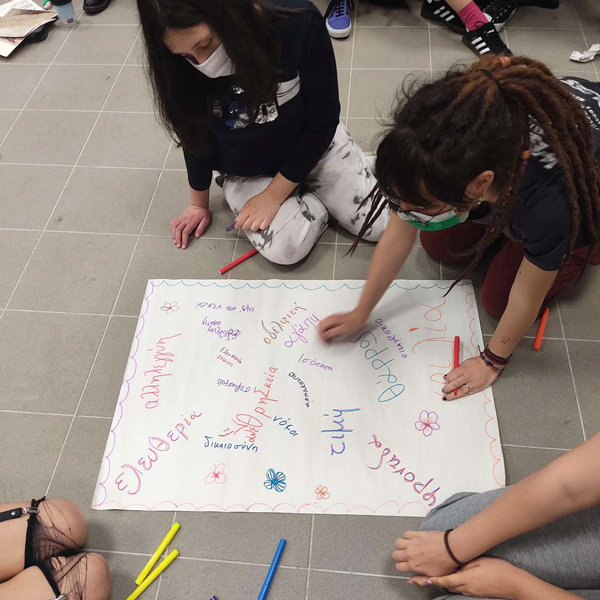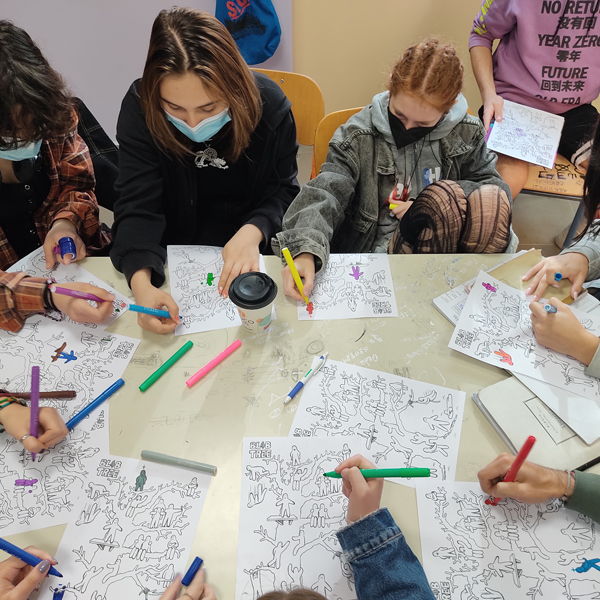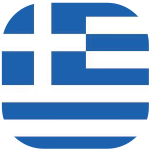Institute of Informatics & Telecommunications
National Centre for Scientific Research “Demokritos”
“Do values travel ?”
The activity entitled “Do values travel?” is mainly addressed to high school students and focuses on the perception and understanding of values by the students themselves, using the text of Sophocles’ Antigone as an educational tool.
Based on the text of the ancient tragedy ‘Antigone’, students are invited to reflect on and discuss the values and moral dilemmas that we, as active citizens, are often called upon to face in our daily lives. The activity is approximately 2.5 hours long and includes individual activities, group work and plenary discussion.
The structure of the activity will be as follows:
- experiential activity of getting to know each other
- short introduction through the use of dialogue
- projection of an extract from a performance of ‘Antigone’ focusing on the dialogue/contrast between Creon and Antigone about the burial of Polynices
- group work
- discussion in plenary
This activity is designed and implemented in the framework of the European project VAST (https://www.vast-project.eu/), which mainly focuses on museum exhibitions and educational activities.
It could be repeated with different groups of students (up to 15 students/group) between 21&22/9/2022.



About the project
The VAST Project aims to study the transformation of fundamental (moral) values across space and time and bring them to the forefront of advanced digitisation.
The project will trace and inter-link the values…
…of the past through the analysis of collections of intangible assets that are expressed in natural language and come from different places and from significant moments of European history, such as theatrical plays, fairy tales, and scientific documents
…of the present through the collection and digitisation of how values are conveyed today and of how the audiences experience and perceive the communicated values. Our pilots focus on the art & cultural industry, science and education.
In the core of VAST lies the VAST Digital Platform. The platform is envisioned to offer not only the knowledge collected during the project but also to offer the tools that support continuous digitization of intangible content and continuous study of values across space and time.

Dr. Georgios Petasis is Researcher in the Institute of Informatics and Telecommunications at NCSR “Demokritos”, in Athens, Greece.
He holds a PhD in Computer Science from University of Athens and his research interests lie in the areas of natural language processing, knowledge representation and machine learning, including information extraction, ontology learning, linguistic resources, grammatical inference, speech synthesis and natural language processing infrastructures. He is the author of the Ellogon natural language engineering platform and co-founder of “Intellitech”, a Greek company specialising in natural language processing.

Dr Dora Katsamori
is a post-doctoral researcher at SKEL, The AI Lab, NCSR ‘Demokritos’ on projects related to education and culture, as well as the connection between technology and society.She holds a PhD in the field of citizenship and adult education from the University of the Peloponnese and she has a long experience as project coordinator and researcher in European and nationally funded projects, as well as a trainer of formal and non-formal education for adults and youth.

Dr Lida Arnellou
is a post-doctoral researcher in the Artifact team (Artificial Intelligence for Culture) at SKEL The AI Lab, NCSR ‘Demokritos’, in projects concerning the development of interactive exhibitions, advanced digitization for cultural heritage, informal education and Science Communication.She holds a PhD in Science Communication from the University of Peloponnese and she has a long experience as Researcher in projects concerning science education, informal education (ex. museums) and the public image of science in the media, as well as Coordinator of the Interactive Science and Technology Exhibition (Eugenides Foundation).
 Institute of Informatics & Telecommunications
Institute of Informatics & Telecommunications
National Centre for Scientific Research “Demokritos”
The Institute of Informatics and Telecommunications (IIT) focuses on research and development in the areas of Telecommunications, Networks, Web Technologies and Intelligent Systems. The Institute pursues both long-term basic research as well as applied research by implementing well defined R&D projects. At the same time, it plays an active role in training new research personnel providing scholarships at graduate and post-doctoral level and their employment in research projects. Particular emphasis is given to the exploitation of research results and its dissemination to the public.
The main strategic objective of IIT is to excel in research and innovation required for the development of the knowledge society.
The activities and know-how of IIT are focused mainly in the following areas:
-Telecommunications & Networking
-Intelligent Information Systems
To succeed in its mission, the Institute : collaborates internationally with industry, commercial companies, as well as Research Institutes and Universities , participates in international standardization efforts, disseminates its research results through publications in international scientific journals and conferences, takes part in workshops, public initiatives and popular activities, coordinates or participates in numerous collaborative research projects, exploits its research results by filing patents and forming spin-off companies or pursuing cooperation with technological companies.







